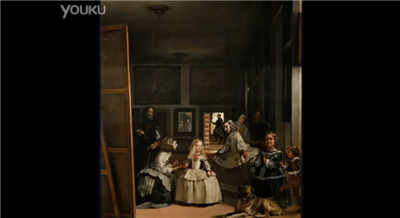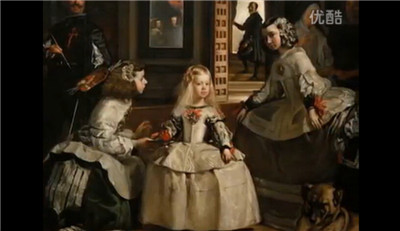Velázquez, Las Meninas, c. 1656
We're in the Prado in Madrid, and we're looking at the great canvas by Velázquez, Las Meninas.
我们在马德里的普拉多美术馆,我们正在看委拉斯奎兹所创作的伟大油画《宫女》。
Did you mean "great" in terms of size? Because it is a very large painting.
你是说在尺寸方面的“伟大”吗?因为这是一幅非常大的画作。
事实上,这是一幅有着非常巨大画作在其中的画作。
That's the same size as the painting it is.
那是和画作本身相同的尺寸。
In fact, some art historians have suggested that the painting that Velázquez (because notice there is a self-portrait of Velázquez in the act of painting) is, in fact, painting the painting that we're looking at. Did you follow that?
事实上,有些艺术史学家提出委拉斯奎兹的画作(因为注意这里有个维拉斯奎兹正进行绘画动作的自画像)事实上,是在画出那幅我们正在欣赏的画作。你有跟上吗?

I did. It is very complicated. So what we're seeing here is, in the center, the princess attended by the maids of honor, a dwarf, her governess, and some other attendants; and on the back wall a mirror, which is the sort of puzzle in a way of the painting.
我有跟上。这是非常複杂的。所以我们在这儿看到的是,在中央,公主让宫女、一个侏儒、她的女家教、还有一些其他的侍者所服侍;在后方墙上有面镜子,那有点像关于那画作的谜团。
We know it's a mirror because unlike the canvases on the back wall, this is a much more reflective surface. We can see the beveled edge of the glass, and of course in that frame, we see a reflection of the King and Queen of Spain, Philip IV and his wife.
我们知道那是面镜子,因为不像在后墙上的油画,这是一个更加反光的表面。我们可看到玻璃的斜边,还有当然在那画框中,我们看到西班牙国王及皇后的映像--肺力四世及他的妻子。
And some art historians have suggested that we must be them looking into the mirror and seeing our own reflection. Others have suggested that, in fact, the mirror is reflecting the image that is being depicted on the canvas by Velázquez.
有些艺术史学家提出,我们一定就是他们,望进那镜子并看到我们自己的映像。其他的人提议,事实上,那镜子正倒映出由委拉斯奎兹描绘在画布上的影像。

And then even other art historians have suggested, yes, the mirror is reflecting what's on the canvas, but the King and Queen are still standing before us, which is why the princess is looking out at us, and even the dog is, in a sense, taking notice.
接着甚至还有其他艺术史学家建议,是的,那镜子正映出在画布上的东西,但国王和皇后仍站在我们面前,这也是为什么公主正向外看着我们,甚至那狗在某种意义上也注意到了。
And why there is sort of just general attention being very much focused on where we are in front of the painting. Perhaps we're in the space of the King and Queen, and this painting was meant for the study of the King, who would have been the person looking at it. So it's very much meant for his gaze.
也是为什么这里就有点大众的注意力非常多数集中在我们在画作前的位置。也许我们就在国王和皇后的位置,而这幅画是预计要描摹国王,国王原本会是要看它的那个人。所以它很大部分是预计要让他仔细端详。
That issue of looking, of gaze, is I think for me really one of the central keys to this painting. It seems to me to be a conversation of glances, a conversation of people reacting to each other's glances, of looking itself, a kind of essay on the way in which we see.
那注视的议题、凝视的议题,我认为对我来说确实是这幅画作的中心关键之一。这对我而言看似一个视线的对话、一段人们对于彼此视线反应的对话、眼神它本身的对话,一种我们看的方式的尝试。
To me it's more of paying attention.
对我来说更像是去注意。
I think that's exactly right, and that would make sense. This is the King and Queen of Spain, one of the most powerful countries on the face of the Earth at this moment.
我觉得那完全没错,那也讲的通。这是西班牙国王和皇后,在当时地球表面上最强大的国家之一。
Yeah, you'd have to pay attention to them if they walked in the room.
是的,如果他们走进那房间,你必须要注意到他们。
You would ignore them at your own peril.
你忽略他们就要自负后果。
Exactly.
没错。
And we can see it when we see the artist, Velázquez, who is first painter to the King looking out to the royal couple. He would have had, of course, the best job that an artist could have in Spain at this moment. I'm interested, though, in the sort of sense of naturalism, the sense of spontaneity, the sense of informality, which is so unexpected in a royal portrait.
我们可以理解,当我们看到那艺术家,委拉斯奎兹,他是国王的第一个画家,向皇室夫妇那头望去。当然,他会拥有当时西班牙的艺术家所能拥有最棒的工作。但是,我对那种自然主义感很有兴趣、对那种自发感、不拘礼节感很有兴趣,那是在皇室肖像中非常出乎意料的。
That's the amazing thing about this painting, I think. It's that makes it so hard to say what it is and makes it so compelling. It's that it's not a portrait. Because we know what portraits look like. They're on the walls all around us.
那是有关这幅画很神奇的事,我认为。就是那让它很难去解释那是什么,且让它如此吸引人们注意。就是那不是一幅肖像。因为我们知道肖像看起来是什么样子。它们在我们周遭的墙上。
And they're very formal portraits of the royal family kind of posing and looking powerful, and that's not what this is. So there is a kind of informality, like a genre painting, like we're looking at something like a day in the life of the painter's studio, but that's not what it is, either, because it is also a portrait. So it sort of straddles this weird line of being both those things.
它们是非常正式的皇室家族肖像,有点非常有力地摆姿势和凝视,那不是这幅画的样子。所以有种不拘礼节的感觉,像是一幅风俗画,像是我们在看着某个像是画家的工作室生活中的一天,但那也不是这幅画的内容,因为它同样也是一幅肖像。所以它有点跨越那条同时是那两件事的怪异线条。
It's like the intimate portrait. It's a portrait that gives you a kind of access to, in a sense, the real moment, the real life within this palace. In fact, some art historians have suggested that the painting is, in part, a way for the artist to promote himself and to show his importance and, in a sense, his value to the court.
那像是私人肖像。这是一幅画,那给了你一种,从某种意义上来看,通往现实时刻的准许、通往这座宫殿中现实生活的准许。事实上,有些艺术历史学家提出这幅画某方面是让艺术家推销他自己的一种方式,还有显示出他的重要性以及,从某种意义上,显示他对宫廷的价值的方式。
The idea that as a painter, he's not just a craftsman, but an intellectual. So here's the irony.If Velázquez is, in a sense, trying to support this notion of the artist as intellectual, and not the craftsman, not the man who works with his hands, the painting is a bravura example of painting.
身为一名画家,他不只是个工艺师,而是一位知识分子这种想法。所以这里是讽刺的地方。如果委拉斯奎兹在某种意义上试着要去支持这个艺术家是知识分子,而不是工艺师、不是用他的双手干活的人这个概念,这幅画就是一幅花俏画作的范例。
We can never get away from the fact that this is fantastic painting; because although there is a tremendous sense of naturalism amongst these figures, the painting is also nothing but a series of strokes of paint.
我们永远无法摆脱这个是惊人画法的事实;因为虽然在这些人物之间有种强烈的自然主义感,但这幅画同时也不过就是一系列颜料的线条。
And I think that's most vividly witnessed in the sleeves of La Infanta, of her attendants, or especially that lightning bolt of a stroke of white that goes down the artist's own sleeve and actually leads our eye to the palette.
我认为那在La Infanta的袖子上、在她侍者的袖子上最清楚看见,或是特别是从艺术家自己的袖子往下的那道闪电状的白色线条,且确实将我们的眼睛引到调色板上。
And here's this sort of most wonderful conundrum. The palette is a representation in space of the raw paint, which is, of course, the very stuff that the artist is using to create the depiction of the thing that it is.
这里是这种最迷人的难题。那调色板是那未干颜料范围内的代表,当然,正是那艺术家用来创造出那事物本身描绘的工具。
What I find so interesting, though, also, is that there is a time when the reverse happens. Look at the way that his hand holds the paint brush. That is raw paint that almost dissolves, that almost refuses to be fingers on a hand. So that he's in a sense playing on that edge.
然而,我同样发现很有趣的,是有一段当相反事物发生的时间。看看他的手握住画笔的方式。那是几乎要融化的未干颜料、几乎不愿成为手上的指头的未干颜料。所以在某种意义上来说他正在那边缘间玩弄。
I can make very loose strokes of the brush, feel clarified and come together and feel like cloth in motion, right? Reflective light, taffeta, what have you. Or I can actually dissolve forms that you expect and allow the thing to become just the act of painting as well.
我可以画出非常稀疏的画笔线条、感受到净化、并集结起来,且感觉像摆动中的布料,对吧?反射的光线、塔夫绸、还有其他类似的东西。或是我可以确实拆解那你预料中的形式,然后也让事情变成只是绘画这个动作。
And I think what adds to this is the fact that we don't see what he's painting. There's a kind of mystery about the alchemy of painting, about how you take medium and solvent and pigment and turn it into reality.
我认为补充说明这个的是我们并没看见他在画什么这件事实。有种关于绘画炼金术的谜团、关于你如何利用材料、溶剂和颜料,并将其变成现实的谜团。
I would say that it's not just reality he's after. I think he's after a kind of condensed reality. I think he's after a kind of heightened experience of looking, a kind of heightened experience of the intimacy of this family, of this moment. And I think that he is doing something that is actually quite poetic and quite philosophical.
我会说这他在追求的不只是事实。我认为他在追求一种压缩的现实。我认为他在追求一种观看更高一层的体验、一种这个家族的亲密度、这个时刻更高一层的体验。我认为他正在做某种确实颇诗意也颇哲学的事情。














